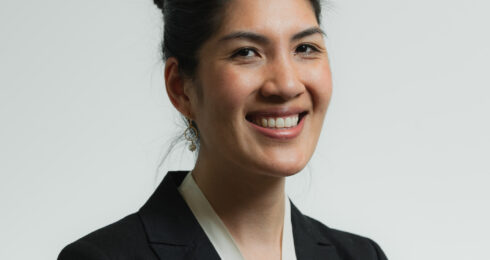
Quantum computing has enormous potential, and the success of quantum technology development and innovation will change many aspects of our lives. It is also a topic that is largely inaccessible to the average person. Parham Pashaei, a PhD student in the Department of Electrical and Computer Engineering, saw an opportunity to speak to a more general audience directly through podcasting. He launched Quantum Bits in December and has been using one-on-one conversations with experts to explore topics in quantum computing, making ideas otherwise limited to academia or industry circles available to a broader audience.
“Over the course of my studies, I have had the luxury of attending talks and seminars by some of the world’s most interesting scientists, engineers, and entrepreneurs. Sometimes I am even able to meet with them and ask questions,” said Pashaei, a former news anchor whose background in broadcast journalism is evident in his style of hosting. “Many people don’t have access to these spaces or these discussions, so the purpose of this podcast is to invite interested listeners into conversations with some of the most interesting leaders in quantum computing right now.”
Supervised in part by Lukas Chrostowski, Professor in the Department of Electrical and Computer Engineering, and supported by Joe Salfi (Assistant Professor, Electrical and Computer Engineering) and Robert Raussendorf (Associate Professor, Physics and Astronomy), Pashaei is part of a team working to make quantum computing and technology fields more accessible and inclusive by generating enthusiasm for its possibilities with groups who are underrepresented in physics, computer science, and engineering.
Pashaei, along with Chrostowski, and Blusson QMI colleagues including Pedro Lopes and Haris Amiri, are part of a Quantum BC-led effort to diversify talent in quantum computing, targeted at BC kids from Kindergarten through Grade 12. While the podcast is targeted at older audiences, the objective is the same: to simplify complex quantum computing topics and make them accessible to a mainstream audience.
“Lukas has been directly involved, and supported and encouraged the podcast from the very beginning,” said Pashaei. “I am very grateful for his support and encouragement for the podcast and have a lot of respect for his commitment to diversity and inclusion and the national effort in quantum computing. I am also grateful for the support of Joe Salfi and Robert Raussendorf for the podcast. Joe has been very kind in supporting the podcast and proposing ideas for better reach.”
Pashaei finds that podcasting is a strong medium for quantum computing content, as the format allows for long, in-depth discussions that allow for more context and analogy-making on complex topics.
Quantum Bits has aired three episodes to date, focused on quantum computing hardware, applications in AI, and entrepreneurship. Pashaei looks forward to hosting speakers from more diverse backgrounds, drawing on a range of expertise across the quantum computing field.
“The strength of Quantum Bits is our guests; we’ve been able to attract interviewees who are not just the best in their field, but they also have fantastic science communication skills,” said Pashaei. “We hope their stories inspire our listeners and demystify quantum computing. We want people to feel like they’re part of a really interesting, ongoing conversation.”
Catch up on existing episodes and subscribe to Quantum Bits at https://anchor.fm/quantum-bits. Expect new episodes each month.


